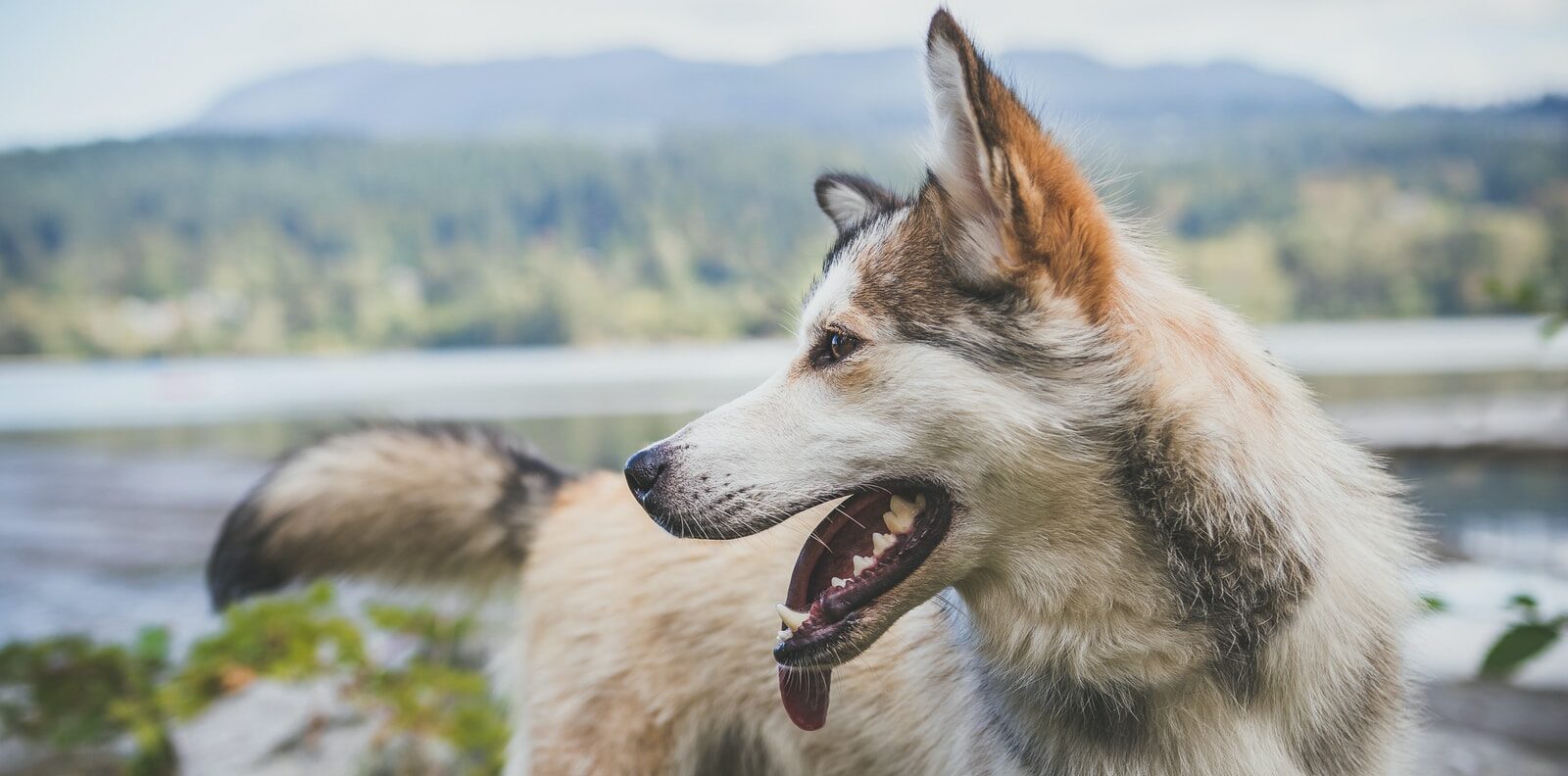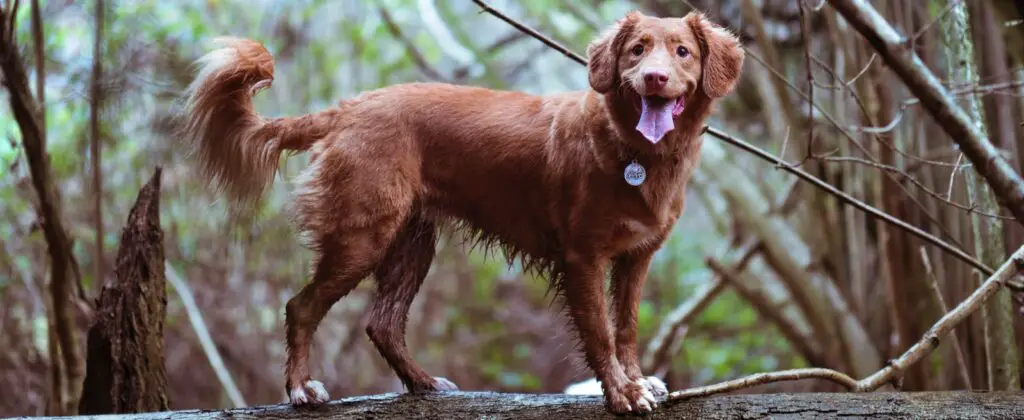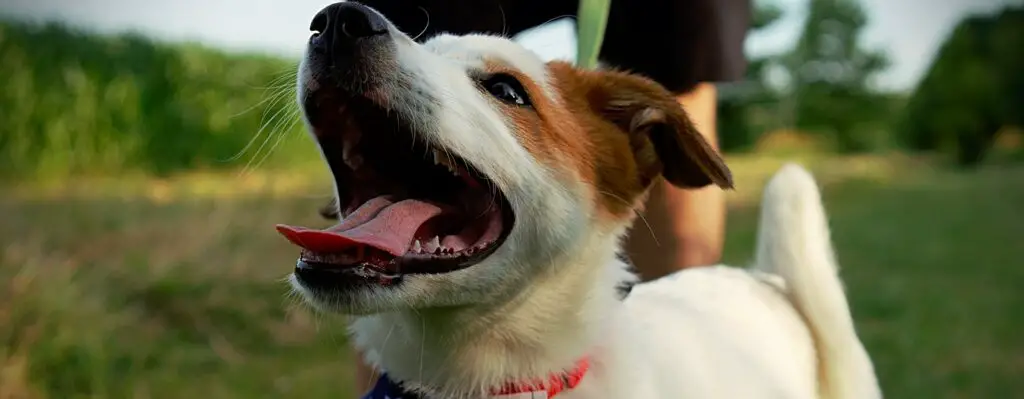
Key points
- Panting is a normal behavior dogs use to avoid overheating. So, there is no need to worry if your dog is panting on a hot day or after exercising;
- Heavy panting with no apparent reason might be a sign of an underlying medical condition, such as laryngeal paralysis, pneumonia, lung tumors, anemia, or Cushing’s syndrome;
- Heatstroke is another dangerous cause of panting in dogs, which might lead to dehydration or even death;
Panting is completely normal behavior for dogs. The dog will stick out its tongue, inhale air through its nose, and exhale it through its mouth. The airflow caused by panting increases moisture evaporation from the mucous membranes, which leads to a drop in body temperature. Dogs can’t sweat as much as humans, so they need to pant to avoid overheating. Vigorous panting is also important after exertion or in extreme heat. And if the dog is panting during or after emotional excitement, this is also classified as normal behavior.
However, heavy panting is different. If you see that your dog pants all the time for no apparent reason, e.g., even in relaxed situations, you should call a vet. This behavior could be occurring due to an illness that cannot be seen at first glance, such as a heart problem. And if you notice symptoms such as cough, fever, or vomiting in addition to panting, it could be a sign that your pet is suffering from a severe disease.
Table of Contents
Why Is My Dog Panting?
Here are some common reasons why a dog may exhibit panting:
Stress, fear, or nervousness
When humans are stressed, nervous, or scared, our pulse rate increases, and breathing accelerates. Dogs also react very similarly to these situations. Their breathing rates will also rise sharply, and the animal will begin to pant.

Such situations are quite common. For example, many animals are frightened during thunderstorms because of their sensitive hearing. The time around New Year’s Eve can also be very stressful for the animals. And if you live near an airport, aircraft noise can also frighten the pet.
As long as these are isolated situations, panting is undoubtedly not a problem. Calm down your dog and give it the opportunity to withdraw. It is also advisable to avoid stressful situations in everyday life as much as possible.

Pain
If the dog is panting very often, it can indicate nausea, discomfort, or pain. In this case, if you also observe parallel lameness or vomiting, these could be symptoms of the underlying problem.
Other signs that your dog might feel discomfort include enlarged pupils, loss of appetite, reluctance to lie down, restlessness, anxiety, and excessive licking at the pain site. Unfortunately, dogs can’t just tell us that they are suffering. So keep an eye on your pet and seek veterinary care if you suspect that it is in distress.
Heart problems
Various heart diseases can lead to a decrease in the pumping capacity of the pet’s heart. As a result, the dog’s cells won’t get an adequate supply of oxygen. As a result, the pet’s resilience will decrease more and more, and the animal will start panting all the time. A backlog of blood in the lungs can also lead to panting and coughing (the so-called “heart cough”).
A vet will likely need to use a chest X-ray or an ECG (echocardiogram) and listen to the pet’s heartbeat and breathing with a stethoscope to detect heart problems.
Cushing’s syndrome
You can determine that your god is likely suffering from Cushing’s syndrome by symptoms such as excessive hunger, thirst and urination, hair loss, and a pot-bellied appearance.
The condition occurs when the pet’s adrenal glands start producing too much cortisol, and it is usually treated using adrenal-suppressing drugs or surgery.
Respiratory disorders
Heavy breathing or panting may also result from respiratory disorders, such as laryngeal paralysis, pneumonia, and lung tumors.
Anemia
Heavy panting and pale mucous membranes can also indicate anemia. Dogs suffering from anemia have insufficient hemoglobin in the red blood cells, which is responsible for transporting oxygen in the blood. As a result, the pet’s resilience drops because its bloodstream fails to supply its cells with enough oxygen.

Heatstroke
Heatstroke (also called overheating) can quickly lead to dehydration, which can be life-threatening in some cases.
The signs of overheating are pretty obvious: your pet might pant very heavily, be restless, and refuse to respond to your words or actions since it is focused on cooling itself. Other heat stroke symptoms in dogs include glassy eyes, weakness, fast heart rate, drooling, seizures, vomiting, and diarrhea.

Heatstroke is a medical emergency, so once you suspect that your dog is suffering from heatstroke, you need to see a vet right away. Your pet’s life will depend on how fast you respond to the situation.
You should consider taking the following first aid measures to try to stabilize your dog’s condition on the way to your vet.
First of all, calm down the pet to prevent it from getting more stressed. At the same time, immediately move the dog into the shade or to a cool area and submerge it in water. Try to use lukewarm water since the cold liquid will cause the pet’s blood vessels to constrict). You should also provide cool drinking water for your furry friend. If the pet becomes unconscious, turn the dog over on its side.
Remember that prevention is the best treatment for overheating. First of all, you should never take your dog on walks in the blazing midday heat. Also, you should try to walk your dog somewhere where there’s enough shade. And it goes without saying that you should never leave your pet in a car in hot weather. This can very quickly become life-threatening for your animal!
Physical activity
Dogs start sweating at temperatures above 20°C. Physical activity increases the pet’s body temperature, so sweat production intensifies as well. If you take your dog on a long, high-speed walk or play with your pet intensively, it will almost always pant a lot afterward. Again, this is a completely natural reaction of the body, and it should not be a cause for concern. Just make sure that your pet has access to enough water after exercise.

Medication
Medications, especially prednisone, prednisolone, or other steroids, may lead to excessive and inappropriate panting. Heavy panting may last for a few weeks after the medication is discontinued. Talk with your vet if your dog’s panting is excessive.

Breed and weight
Panting is influenced by the dog’s body type and physical condition. For example, canine obesity can quickly lead to breathing problems. Plus, some dog breeds pant more than others. This includes animals with short snouts or particularly round heads. These dogs’ airways are shortened, and their nostrils are quite narrow, which causes breathing difficulties.

As a result, some canines such as Boston terriers, bulldogs, and pugs may pant during a brisk walk, even in mild heat. It is important to be conscious of these challenges and ensure that you don’t walk dogs of these breeds too fast because constant panting can put a strain on the pet’s heart.
Other Causes Of Panting In Dogs
Intense panting in dogs can also result from milk fever (eclampsia). It is a severe medical condition that affects nursing mothers. If a pet develops this condition, it will be unable to stand or walk due to low blood calcium levels.
Allergies, infections, or irritation in the airways can also result in breathing problems in dogs.
No matter how your pet usually breathes, it is always a good idea to call a vet if you notice an unexplained change.
Treatment
Since panting is just a symptom that can have many underlying causes, treatment plans for the issue also vary widely. In addition to acute emergencies such as high fever, poisoning, etc., the condition may also be triggered by chronic illnesses. While conditions that cause acute pain can be resolved relatively quickly, chronic issues will require life-long treatment.
FAQ
How do I know if my dog is panting too much?
If your dog is panting even when it is not hot, stressed, or excited, it might be abnormal. Panting is also considered to be excessive when it differs from your dog’s normal breathing pattern.
Why is my dog panting when doing nothing?
If there is no evident reason for panting and the pet is not too hot, panting could be a sign of a serious medical condition such as Cushing’s syndrome, anemia, respiratory disorders, or heart problems.
Why is my dog panting and breathing fast?
Excitement or vigorous physical activity are two of the reasons for panting and fast-paced breathing in dogs. However, stress, fear, nervousness, or heat can also influence the way your dog breathes.




